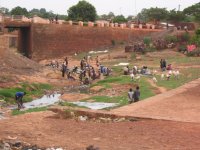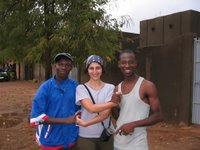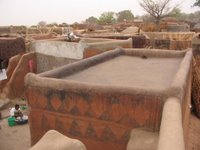Summer Time
Generally June to September is slow in Burkina. There are two reasons for this; one it is the rainy season and activities on the field are limited due to weather conditions and road blockages, secondly it is vacation time. In fact most offices are closed during the month of August.
As for what I have been doing: lots of office work; report writing, verifying budgets, random meetings… definitely not as exciting as going to the field and interacting with our beneficiaries. On the positive note, like others I was also on vacation for the first two weeks of August and visited some other West African countries, namely Senegal and Mali.
Senegal located on the coast of Atlantic Ocean is so far the most beautiful country that I have visited in West Africa. Dakar, the capital city, is said to be the Paris of Africa with French style architecture, narrow streets, colonial houses…However, sometimes it’s hard to believe that you’re still in Africa, high-rises in the business district and lots of ‘Tubabs’ (white person in local language) in town, less women wearing traditional clothing and cars and traffic all over the place.
After spending few days in Dakar and getting mugged almost twice (don’t recommend walking alone at night time or carrying valuables) we headed to the southern part of Senegal, passed through Gambia and reached the tropics of Casamance.
One of the highlights of the trip was visiting il de Goré, an island that is said to be the first entry point of European settlers in West Africa and the largest trading port for slavery in the region. This is also a UNESCO world heritage site. Although, they could have done a better job of preserving the site, it was still interesting to see some of the old and historical buildings such as ‘maison des esclaves’ (this is where slaves were kept with no food or water till they were shipped as “can of sardines” to the new world) and reading about the horrendous realities of slavery that took place during colonialism of Africa.
Another highlight was a bike trip that I took in the Casamance region to visit the surrounding areas, lush and green with amazing birds and very friendly people. I was even more excited when I stopped in a village to have lunch with a family and watched TV that was operating on solar energy!
Mali was the next stop. Although it was my third time in Mali, I was still fascinated by the rich culture and various flavours that this country has to offer. There is a sense of mystery and undiscovered truth about Mali. A mixture of tribes with some still living their traditional lives makes it one of the most exotic places that I have ever been too. But the most interesting part for me was interacting with the locals and going beyond the exotic surface to discover that they are just people like myself with similar needs. Unfortunately being a tourist makes your interactions with the locals very different compare to being a resident in the area. Taking local transports is a great way to be less of a tourist while travelling as the ride is often long (normally two or three times longer than what you would expect!!) and after the first thirty minutes they generally forget that you are a white person in the car and interactions continue as if you’re not there, the laughing together, the crying babies, the loud and intense discussions that you have no idea what they’re talking about…These transports carry anything from chicken to vegetables to human beings and are packed to an extend where its hard to breath. It could be very exhausting but at the same time it gives you an opportunity and a window to the lives of the local people in the region which I appreciate a lot more than being a passing by tourist.
Besides vacation, August was also mid-way to my work here in Burkina and I have spend abit of time reflecting on what I have been doing, and what I need to be doing next as well as thinking about international development in general and the role of westerners in it. Well, it hasn’t been easy to arrive at a solution. I was recently asked what I thought was the most impact that westerners could have overseas (in international development). I am going to end this entry with my answer to that question so to let you know abit about my thoughts on development in Africa.
"This is really tough to answer! Being in the national office, I have had the opportunity to see ‘westerners’ walking in and working in different areas of the program. I have seen their interactions with my team and some of them have impressed me with the work that they have done (and some have been disappointing). However, the ones who have impressed me are normally consultants with years of experience and some have lived in Africa for the past 10-15 years. They are very credible and have high influence on my team. But they also understand the culture, the country and the systems within the country. Yet, there are other ones who do not have a great understanding of realities of the program, and often do not pay attention to the concerns of the team. Unfortunately they seem to be the most powerful ones due to the position they occupy and that often makes me frustrated. What if this westerner in his powerful position was replaced with a Burkinabe leader? Why shouldn’t he? Shouldn’t it be a capable Burkinabe leader deciding steps to reduce poverty in his country? Why is it the role of this westerner to come from somewhere else and tell people what to do here? Unfortunately, Africa seems to be dependent on westerners not only financially but also in “show me the right way” kind of attitude and this I believe has been brought forth by westerners themselves. From colonialism and slavery to today’s interaction with Africans, westerners have projected an image of “I am better than you and therefore I know more than you”. This seems to be ingrained in Africa and it might take a long time to change this mentality and make Africa believe in itself. It’s interesting to compare however Africa’s perspective of westerners with that of other developing countries, Iran for example. Iran seems to be the opposite of the pole where westerners are portrayed as evil and that we should not allow any influence from the west. Although, this is also going to the extreme, Iran has been able to manage itself. So, I am not really sure what the solution is but I do know that I as a westerner do not want to present an image of superiority by claiming to know the right way. Who knows what the right way is anyways? We often talk about ending poverty, yet poverty I believe has different forms. While Africa might be poor in having access to infrastructures that we, westerners, have enjoyed for years, we are also poor in what is rich in Africa, solidarity. So, at this point while I am still learning, I see my role in exchanging my experiences and to share what has helped me in different areas that could possibly be of help here in addition to learning from African practices that can help me and my country. Yet, I do not claim to know more. In working with some of those experienced consultants, I have realized that I have a long way to go before claiming I know something. I don’t know if I answered the question, but I guess I can say that I agree with Jeffrey Sachs (author of The End of Povety)in that Africa can benefit greatly from financial resources of the West."



 to show appreciation. Each family is dressed in these crazy outfits with masks on their faces. There are drummers playing as the dancers enter the centre of a huge crowd and start their moves. This was quite interesting to watch. Unfortunately I couldn’t take good pictures. Here in Burkina some believe that if you take a picture you will steal their soul and so you always have to ask before taking a picture. The few times that I did ask, it was not permitted.
to show appreciation. Each family is dressed in these crazy outfits with masks on their faces. There are drummers playing as the dancers enter the centre of a huge crowd and start their moves. This was quite interesting to watch. Unfortunately I couldn’t take good pictures. Here in Burkina some believe that if you take a picture you will steal their soul and so you always have to ask before taking a picture. The few times that I did ask, it was not permitted.








